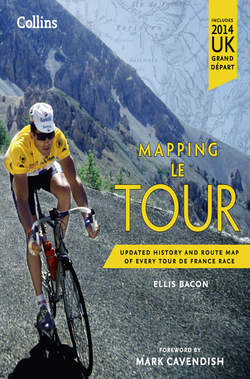Читать книгу Mapping Le Tour: The unofficial history of all 100 Tour de France races - Ellis Bacon - Страница 22
Оглавление1914
12th Edition
| Start: Paris, France, on 28 JuneFinish: Paris, France, on 26 July | |
| Total distance: 5391 km (3350 miles)Longest stage: 470 km (292 miles) | |
| Highest point:Col du Galibier: 2556 m (8386 ft)Mountain stages: 7 | |
| Starters: 145Finishers: 54 | |
| Winning time: 200 h 28’ 48”Average speed: 27.028 kph (16.795 mph) | |
| 1. Philippe Thys (Bel)2. Henri Pélissier (Fra) at 1’ 50”3. Jean Alavoine (Fra) at 36’ 53” |
After 1913’s relatively close finish to the race, reigning champion Philippe Thys started the 1914 Tour in earnest, winning the sprint from an eleven-man lead group on stage 1,and then never letting go of the lead again. It looked as though it was going to be a dominating show of riding from the Belgian.
Sure enough, Thys had built up a 35-minute lead over Henri Pélissier, a 25-year-old Frenchman riding his first Tour de France, by the time the race exited the Pyrenees. Pélissier pushed the race leader hard in the Alps, but had only been able to reduce his deficit by a few minutes going into the fourteenth and penultimate stage between Longwy and Dunkirk.
Thys, however, was docked 30 minutes for an illegal wheel change on the stage, and Pélissier trailed Thys by just 1 minute 50 seconds when they reached the finish in the Parc des Princes in Paris the next day, having won three stages along the way.
The 1914 Tour also saw the first participation by an Australian rider, with two of them – Don Kirkham and Iddo ‘Snowy’ Munro – lining up together for the off in Paris at the end of June.
Both made it all the way around and back to Paris, in seventeenth and twentieth place, respectively, but another foreign rider, poor Ali Neffati – a Tunisian riding his second Tour who had garnered a number of fans for choosing to wear a fez while he rode – was less fortunate, hit by one of the organisation’s cars on stage 6, and forced to abandon for the second year in a row.
Two days after the race finished in Paris, Austria-Hungary declared war on Serbia, following the assassination of Archduke Franz Ferdinand a month earlier, on the day the Tour had started. The First World War would put paid to the Tour de France for the next five years.
Debutant Henri Pèlissier races from Grenoble to Geneva
